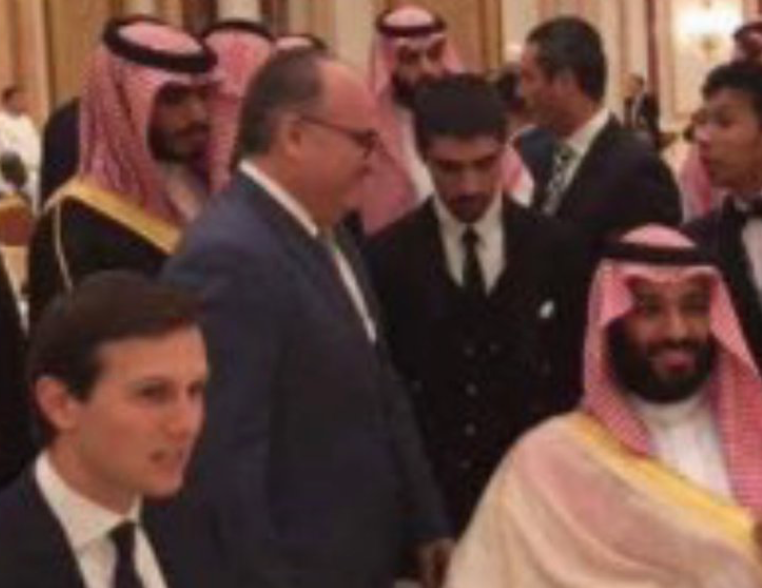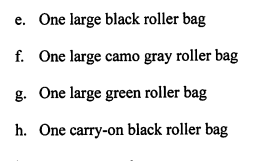In this series, I’m analyzing the Mueller questions written down by Jay Sekulow and leaked to the NYT to show how they set up a damning investigative framework. This post laid out how the Agalarovs had been cultivating Trump for years, in part by dangling real estate deals and close ties with Vladimir Putin. This post shows how during the election, the Russians and Trump danced towards a quid pro quo agreement, with the Russians offering dirt on Hillary Clinton in exchange for a commitment to sanctions relief, with some policy considerations thrown in.
Here, I’ll lay out the questions that show Mueller’s interest in how Trump and the Russians began settling the quid pro quo during the transition. To the extent these are quid pro quo payoffs, and not simply Logan Act violations, they’d be key elements in a conspiracy.
The quo: policy payoffs
Immediately after the election, the Russians called to collect on their winnings.
According to Jared Kushner’s statement to Congress, the day after the election, Putin sent a congratulatory email to the campaign. In response, he reopened communications with Sergey Kislyak. A day later, the Agalarovs emailed congratulations to let the Trumps know they were “always at your disposal here in Russia.”
“Don!!! Amazing run and a glorious victory!!!!! Congratulations to you and your dad, we are proud and happy for you !!!!!! Always at your disposal here in Russia
On November 28, Rob Goldstone sent an email passing on sanctions materials to Trump’s assistant Rhona Graff.
“Aras Agalarov has asked me to pass on this document in the hope it can be passed on to the appropriate team.
Natalia Veselnitskaya, too, followed up on her Magnitsky request.
In addition to the sanctions demand, according to Jared, the Russians emphasized policy concessions on Syria. A retracted Brian Ross story said that emphasis started even before the election, but in reality the outreach happened almost immediately after the election.
December 1, 2016: What did you know during the transition about an attempt to establish back-channel communication to Russia, and Jared Kushner’s efforts?
On December 1, Jared and Flynn met with Sergey Kislyak. Jared reportedly asked for the Russians to provide a secure channel. Jared claims the idea for a secure channel came from Kislyak (Mueller likely has intercepts that clarify Kislyak’s version of the story). But he makes it clear the back channel pertained to Syrian policy.
[Kislyak] especially wanted to address U.S. policy in Syria, and that he wanted to convey information from what he called his “generals.” He said he wanted to provide information that would help inform the new administration. He said the generals could not easily come to the U.S. to convey this information and he asked if there was a secure line in the transition office to conduct a conversation. General Flynn or I explained that there were no such lines. I believed developing a thoughtful approach on Syria was a very high priority given the ongoing humanitarian crisis, and I asked if they had an existing communications channel at his embassy we could use where they would be comfortable transmitting the information they wanted to relay to General Flynn. The Ambassador said that would not be possible and so we all agreed that we would receive this information after the Inauguration.
Given how often Kushner and Trump talk face to face, this may be one of the questions about which Mueller has the least certainty of the answer. But we know that in Jared’s interview with Mueller’s prosecutors, they focused on that meeting. They also asked if he had information that exonerated Flynn; his answers (and Flynn’s reported unhappiness that Trump had proven disloyal) led immediately to Flynn’s plea deal, so for some reason Mueller must believe Flynn over Kushner.
Mueller’s interest in how much Trump knew about Kushner’s pursuit of a back channel is important for several reasons. It provides evidence that Kushner (and the Trump Administration generally) was engaged in what I call ConFraudUs on foreign policy, pretending to pursue US foreign policy that actually served other interests. And Kushner’s pursuit, possibly at Trump’s direction, of unmonitored channels is important background to Trump’s response as it became clear the FBI had collected evidence of wrong-doing during the transition.
Curiously, Sekulow’s version of these questions does not include one about Kushner’s December 13 meeting with Sergey Gorkov, the head of the sanctioned Vnesheconombank.
December 29, 2016: What did you know about phone calls that Mr. Flynn made with the Russian ambassador, Sergey I. Kislyak, in late December 2016?
According to Flynn’s Statement of Offense, as he was on the phone with Kislyak, he was coordinating closely with a transition official we know to be KT McFarland.
On or about December 29, 2016, FLYNN called a senior official of the Presidential Transition Team (“PTT official”), who was with other senior ·members of the Presidential Transition Team at the Mar-a-Lago resort in Palm Beach, Florida, to discuss what, if anything, to communicate to the Russian Ambassador about the U.S. Sanctions. On that call, FLYNN and the PTT official discussed the U.S. Sanctions, including the potential impact of those sanctions on the incoming administration’s foreign policy goals. The PIT official and FLYNN also discussed that the members of the Presidential Transition Team at Mar-a-Lago did not want Russia to escalate the situation.
Immediately after his phone call with the PTT official, FLYNN called the Russian Ambassador and requested that Russia not escalate the situation and only respond to the U.S. Sanctions in a reciprocal manner.
Shortly after his phone call with the Russian Ambassador, FLYNN spoke with the PTT official to report on the substance of his call with the Russian Ambassador, including their discussion of the U.S. Sanctions.
On or about December 30, 2016, Russian President Vladimir Putin released a statement indicating that Russia would not take retaliatory measures in response to the U.S. Sanctions at that time.
On or about December 31, 2016, the Russian Ambassador called FLYNN and informed him that Russia had chosen not to retaliate in response to FL YNN’s request.
After his phone call with the Russian Ambassador, FLYNN spoke with senior members of the Presidential Transition Team about FL YNN’s conversations with the Russian Ambassador regarding the U.S. Sanctions and Russia’s decision not to escalate the situation.
We know Mueller has an email — one the transition probably didn’t turn over to Congress in voluntary discovery, and about which they may have intended to invoke executive privilege — that captures part of the discussion about sanctions. Of critical importance, the transition team opposed these sanctions for two reasons: 1) because they wanted better relations with Russia and 2) because they believed that sanctioning Russia for tampering with the election created the appearance that Trump wouldn’t have won without Russia’s help.
On Dec. 29, a transition adviser to Mr. Trump, K. T. McFarland, wrote in an email to a colleague that sanctions announced hours before by the Obama administration in retaliation for Russian election meddling were aimed at discrediting Mr. Trump’s victory. The sanctions could also make it much harder for Mr. Trump to ease tensions with Russia, “which has just thrown the U.S.A. election to him,” she wrote in the emails obtained by The Times.
Mr. Obama, she wrote, was trying to “box Trump in diplomatically with Russia,” which could limit his options with other countries, including Iran and Syria. “Russia is key that unlocks door,” she wrote.
She also wrote that the sanctions over Russian election meddling were intended to “lure Trump in trap of saying something” in defense of Russia, and were aimed at “discrediting Trump’s victory by saying it was due to Russian interference.”
“If there is a tit-for-tat escalation Trump will have difficulty improving relations with Russia, which has just thrown U.S.A. election to him,” she wrote.
In other words, Mueller has a good deal of evidence showing that Flynn’s actions were closely directed from Mar-A-Lago. He has multiple different versions from people involved about how closely Trump was involved in this direction. He also has substantial evidence that suggests that the worry about diminishing the victory idea actually comes from Trump. The question, then, aims not just to prove that Trump ordered Flynn to undermine the official policy of the United States at a time when he did not have the authority to set US foreign policy, but also to tie these orders to the response Trump took as FBI started discovering his conspiracy with the Russians.
January 11, 2017: What do you know about a 2017 meeting in Seychelles involving Erik Prince?
After Jared asked for a back channel, after UAE’s crown prince Mohamed bin Zayed al-Nahyan made an unannounced visit to Trump Tower with Jared, Flynn, and Steve Bannon in December, Erik Prince ended up at a meeting in the Seychelles set up by Nahyan with Russian Direct Investment Fund head Kirill Dmitriev and a bunch of other shady funders. On top of looking like the back channel Jared had been seeking in December, the meeting is also a logical follow-on to Jared’s meeting with Gorkov (RDIF is a somewhat less sanctioned subsidiary of Vnesheconombank).
Mueller has George Nader’s testimony about what happened at this meeting, and probably a good deal of SIGINT, which reportedly shows that Erik Prince lied in his HPSCI testimony when he claimed his meeting with Dmitriev had been a chance encounter.
On or around January 11, 2017, I traveled to the Seychelles to meet with some potential customers from the UAE for the logistics business of which I am chairman. After the meeting, they mentioned a guy I should meet who was also in town to see them, a Kyrill Dmitriev from Russia, who ran some sort of hedge fund.
I met him in the hotel bar, and we chatted on topics ranging from oil and commodity prices to how much his country wished for resumption of normal trade relations with the — relationship with the USA.
Even Prince’s testimony ties sanctions relief with policy considerations in Syria and elsewhere that countered the official policy of the US. And it likely also ties those policy considerations to the personal enrichment of people like Prince and Jared, if not Trump personally.
One note: by repeatedly pitching Trump and his associates using businesses under sanction, the Russians provided Trump with his own incentive to relieve sanctions, the opportunity for Russian investment.
Late January, 2017: What do you know about a Ukrainian peace proposal provided to Mr. Cohen in 2017?
In late January 2017, just after the inauguration, Ukrainian parliament member Andrii Artemenko met with Felix Sater and Michael Cohen to propose a peace deal for Ukraine that would have Ukrainian voters endorse a long term lease of Crimea for Russia and undermine the government of Petro Poroshenko. Cohen passed on the plan to Flynn just before he resigned. Sater — who claims to be cooperating with Mueller — said that the deal was endorsed by Russia.
Given Sater’s involvement in brokering both the Trump Tower deal and this with Cohen, it’s possible that this deal is another thing that ties policy concessions to Russia with business deals for Trump. Mueller will have both Sater and Flynn’s version of this story. Any records pertaining to it seized by SDNY will be preserved until such time as Mueller asks for them.
RESOURCES
These are some of the most useful resources in mapping these events.
Mueller questions as imagined by Jay Sekulow
CNN’s timeline of investigative events
Majority HPSCI Report
Minority HPSCI Report
Trump Twitter Archive
Jim Comey March 20, 2017 HPSCI testimony
Comey May 3, 2017 SJC testimony
Jim Comey June 8, 2017 SSCI testimony
Jim Comey written statement, June 8, 2017
Jim Comey memos
Sally Yates and James Clapper Senate Judiciary Committee testimony, May 8, 2017
NPR Timeline on Trump’s ties to Aras Agalarov
George Papadopoulos complaint
George Papadopoulos statement of the offense
Mike Flynn statement of the offense
Internet Research Agency indictment
Text of the Don Jr Trump Tower Meeting emails
Jared Kushner’s statement to Congress
Erik Prince HPSCI transcript
THE SERIES
Part One: The Mueller Questions Map Out Cultivation, a Quid Pro Quo, and a Cover-Up
Part Two: The Quid Pro Quo: a Putin Meeting and Election Assistance, in Exchange for Sanctions Relief
Part Three: The Quo: Policy and Real Estate Payoffs to Russia
Part Four: The Quest: Trump Learns of the Investigation
Part Five: Attempting a Cover-Up by Firing Comey
Part Six: Trump Exacerbates His Woes













